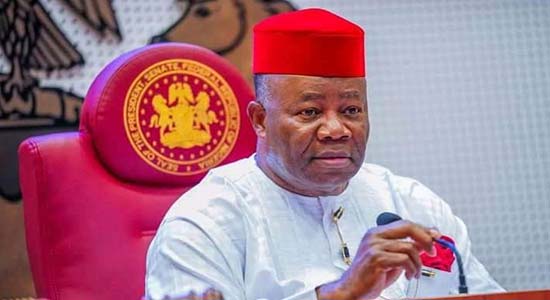Nigeria’s Senate President, Godswill Akpabio, has advocated behavioural change as a major tool to tackling the menace of corruption and failing social values in the country.
Speaking at the National Policy Dialogue on Corruption, Social Norms and Behavioural Change in Nigeria, organised by the Independent Corrupt Practices and Other Related Offences Commission (ICPC) in Abuja on Tuesday, Akpabio described fighting corruption as a complex and multifaceted challenge.
Akpabio, who was represented by Dr. Saviour Enyiekere, Deputy Chief of Staff to the Senate President, stated ‘‘of particular interest to me, is the issue of behavioural change as a precursor to winning the war against corruption.
Also read; We accept your apology over ”morons” comment– Akpabio tells a nominee
‘‘Undoubtedly, behavioural change is a deeper issue which if contextually understood, could be our single biggest instrument in addressing corruption and the progressive destruction of social norms in our communities.
‘‘While we admit the reality of corruption in our system, we must first admit that we will fail at every effort to address this problem until we begin to change focus and address the issue of behavioural change which is about altering or modifying individual or collective patterns of behaviour whilst consciously adopting new attitudes or responses to situations. It also involves discontinuing existing behaviours or modifying the frequency and intensity of current behaviours.’’
According to him, ‘‘The process of behavioural change typically involves awareness and recognizing the need for change and potential benefits and consequences associated thereof.
‘‘This affects gathering information, learning, and becoming aware of existing behaviours. It also involves motivation and developing the desire to change. The motivation to change certain behaviours can be influenced by personal goals, values, social pressures, or external incentives.
‘‘Essentially, behavioural change becomes possible when we educate and inform by providing accurate and relevant information about the unacceptable behaviours, its consequences, and alternative options. This helps individuals make informed decisions and understand the benefits of the change that we seek.’’
The Senate President in his goodwill message said he believes in achieving behavioural changes, incentives and rewards play a great role as they tend to reinforce desired behaviours.
‘‘Tangible rewards, recognition, or positive feedback that encourages individuals to continue or adopt new behaviors have the capacity to drive people towards new behaviors.
‘‘In attacking failing social norms too, I believe that enhancing individual capabilities and skills required for behavioural changes through training, coaching, or resources to build the necessary knowledge for self-efficacy, self-reliance and self-confidence can go a long way in improving social values.
‘‘As we know, fighting corruption is a complex and multifaceted challenge. However, we must keep harping on the need to fight it and also, point out strategies that will help our Country to give the fight all the push that it deserves.
‘‘For me, tackling corruption involves transparency and accountability. It is also about strengthening the legal frameworks. Nigeria is not lacking in such legal frameworks and the 10th Senate under my Leadership is positioned to bridge any existing legislative gaps in the fight against corruption.
‘‘However, institutions like the ICPC must enforce comprehensive anti-corruption laws that criminalize corrupt activities, establish clear guidelines for ethical behaviours. The extant laws of Nigeria have provided for the independence of the judiciary and effective law enforcement agencies to investigate and prosecute corruption cases.
‘‘I also believe that we must develop the courage to promote a culture of ethics and integrity in our schools. This is because fostering a culture of ethics and integrity in the society through education and awareness campaigns will help to promote such values as honesty, transparency, and accountability from an early age. We must make deliberate efforts to encourage civil society organizations, the media, and educational institutions to play active roles in promoting ethical behaviours as well.
‘‘We must also seek new ways of fostering active and engaged civil society that can hold governments at all levels accountable. If we must win the war on corruption, we must also improve on our financial transparency rating by promoting responsible business practices, and strict enforcement of anti-corruption procedures in both public and private sectors,’’ the Senate President observed.
Noting that corruption is an ongoing process requiring sustained efforts and the involvement of all, he called on stakeholders, legislators, executives, faith institutions, all levels of governments, civil society, the private sector, and citizens to be involved in fighting corruption, improving social norms and achieving behavioural changes in Nigeria.

